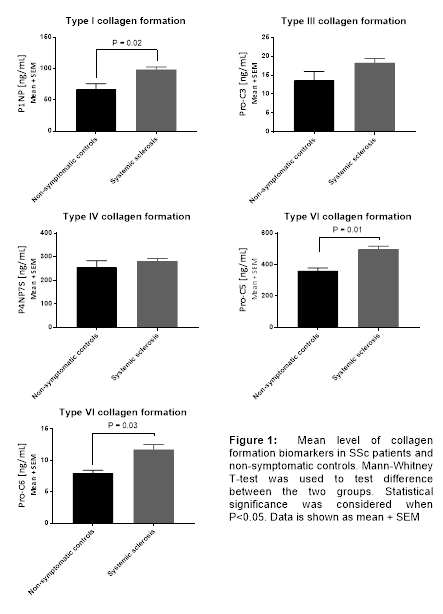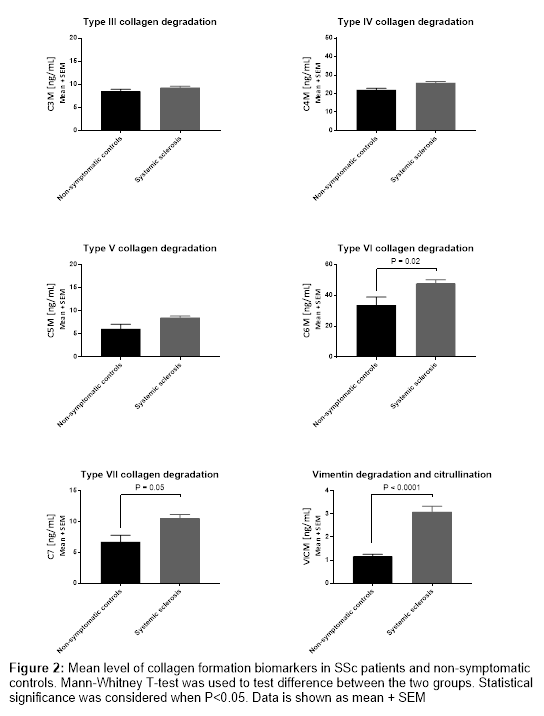Session Information
Date: Sunday, November 5, 2017
Session Type: ACR Poster Session A
Session Time: 9:00AM-11:00AM
Background/Purpose: Systemic sclerosis (SSc) is a multisystem, autoimmune disease characterized by immune dysregulation, vasculopathy and excessive fibrosis of the skin and internal organs. Fibrosis is the pathological state where the unbalance in ECM turnover is shifted towards increased formation. The main family of ECM protein is collagen and the excessive fibrosis results in release of ECM fragments to circulation, where they may be quantified as biomarkers. Skin is rich in type I and III collagen, while type IV, V, VI and VII collagen is present to a lesser amount. The objective is to investigate if the level of collagen turnover could aid in describing skin fibrosis in SSc.
Methods: SSc patients (n=121) from a cross-sectional study fulfilling the 2013 ACR/EULAR SSc criteria were included together with non-symptomatic controls (n=9). The study included both limited SSc (ln=79) and diffuse SSC (n=42). The mean age of the population was 57.4 (SD 11.6) years, 84% were female, mean disease duration was 11.7 (8.9) years and mean skin score was 11.2 (8.6). Biomarkers of type I, III, IV, V and VI collagen formation (PINP, PRO-C3, P4NP7S, PRO-C5 and PRO-C6, respectively) and type III, IV, V, VI and VII collagen degradation (C3M, C4M, C5M, C6M and C7M, respectively) were assessed in serum by competitive ELISAs. Furthermore, a biomarker of a degraded and citrullinated form of vimentin (VICM) was measured in serum. Statistical differences between non-symptomatic controls and SSc patients was tested by t- test (Mann-Whitney).
Results: In SSc patients formations biomarkers of type I, VI and VII collagen was significantly increased compared to non-symptomatic controls (PINP: P=0.02, PRO-C5: P=0.01, PRO-C6: P=0.03) (Figure 1). Formation biomarkers of type III and VI collagen were not significantly increased. The degradation biomarkers of type III, IV and V collagen were not significantly increased in SSc patients (Figure 2). However, degradation of type VI and VII collagen (C6M: P=0.02 C7M: P=0.05) were significantly increased in SSc patients. Furthermore, VICM was also significantly elevated in SSc patients compared to non-symptomatic controls (P<0.0001).
Conclusion: This pilot study showed that collagen turnover appears to be significantly different between SSc patients and non-symptomatic controls. Even if the collagen formation is increased, the degradation of all collagens are not. These data suggest that serological assessment of ECM turnover could be relevant in SSc, and offers area of investigation of disease pathogenesis.
To cite this abstract in AMA style:
Juhl P, Mogensen M, Iversen L, Karlsmark T, Karsdal M, Bay-Jensen AC, Siebuhr AS. Serological Biomarkers of Collagen Formation Is Increased in Systemic Sclerosis [abstract]. Arthritis Rheumatol. 2017; 69 (suppl 10). https://acrabstracts.org/abstract/serological-biomarkers-of-collagen-formation-is-increased-in-systemic-sclerosis/. Accessed .« Back to 2017 ACR/ARHP Annual Meeting
ACR Meeting Abstracts - https://acrabstracts.org/abstract/serological-biomarkers-of-collagen-formation-is-increased-in-systemic-sclerosis/


